When we go and visit nature’s home, we have to remember to be a good houseguest. It breaks my heart whenever I find trash or remnants from previous campers when I pull up into the site. We must remember to not only appreciate the outdoors when we camp, but to respect it as well. That is why I am a firm advocate for practicing zero-waste camping.
Most campers have heard of ‘Leave No Trace’ – a set of principles that promote conservation while enjoying the outdoors. One of the principles is “dispose of waste properly” so you’re not leaving garbage in the great outdoors. But does this principle go far enough? Even better for nature conservation is zero-waste camping.
Tips for Zero-Waste Camping
Despite the fact that camping is a way to connect with nature, it often produces a lot of waste. Even if you bag your trash up and take it home to dispose of it, that waste has a long-term effect on our planet. Fortunately, zero-waste camping is possible. It takes more planning and effort, but for campers with an eco-friendly mindset, it’s worth the work. This guide will cover everything I do in order to have the smallest impact possible when camping with my family.
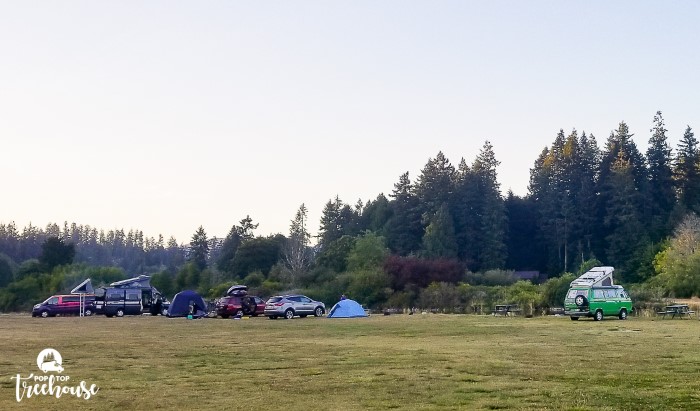
1. Borrow Gear or Buy It Secondhand
Just like tech companies releasing new versions of their phones every year, outdoor companies are always releasing new and improved versions of the gear they sell. Although those shiny new features are undeniably tempting, you don’t need to purchase fresh gear to go camping. If you’re a first-time camper, make a list of what you need and ask friends if you can borrow anything you don’t have. For the items you’re unable to borrow, try to buy them used. There are secondhand stores specifically for outdoor gear, but classic secondhand shops sell camping gear as well. You can also check sites like Craigslist and Facebook Marketplace for deals from sellers in your area.
If you purchase or already have gear that is broken or ripped, check out the company’s repair policy. Many outdoor companies will fix broken gear for free or a small fee. Otherwise, talk to a tailor or a friend with sewing skills to give your gear new life. Always try to fix something first before choosing to go with something new.
2. Pack Reusable Kitchenware
Forego disposable plates and utensils and opt for reusable dishes instead. Bring one set of dishes and utensils for everyone on your trip. If you don’t have any dishes that aren’t made of glass or ceramic, shop secondhand for stainless steel or used plastic plates. And, instead of cooking in foil, pack a cast-iron skillet that you can use over the fire. Camping dishes certainly don’t have to be a pretty, matching set…they just have to work!
3. Keep an Eye on Food Waste
When your goal is a zero-waste camping trip, you should also pay attention to food waste. To avoid producing waste with what you eat, you should plan meals intentionally, pack food in reusable containers, and compost.
Plan Meals Intentionally
While it’s always a good idea to pack some extra food in case of an emergency, don’t overdo it. Consider how much you will actually eat, and don’t bring more than you’ll finish. Trust me, I know how hard it is to not buy extra at the grocery stores! Plan healthy meals that your group will enjoy, but make them a little simpler than you would at home. Cooking outdoors is one of the best parts of camping, so enjoy it!
Pack Food in Reusable Containers
Food wrappers and single-use containers are one of the greatest sources of camping waste. Try to buy as much of your camping food as possible in bulk and pack it in reusable containers. Or, make your own snacks and meals ahead of time and pack them up. Some ideas for reusable food containers include:
- Mason jars
- Fabric “sandwich bags”
- Burlap sacks
- Watertight silicone bags
- Stainless steel containers
- Tupperware

Compost Food Waste
You’re likely to produce some food waste when cooking, so be prepared to compost it. Cut down on the compost you’ll need to worry about while camping by completing the majority of your food prep at home. Cut, core, and peel produce in your own kitchen and compost the offcuts at your home compost before you leave. When it comes down to it, I know that sometimes our eye is bigger than our stomach, so try to compost any uneaten food as well.
Unless your campsite is really cool and has its own compost setup, be prepared to collect your compost and take it home with you. You should never bury your compost at campsites or in the woods. Pack an airtight container and place any food waste in it to compost when you get home.
4. Bring Toiletries from Home
Avoid buying those miniature travel toiletries from the store. These get used up quickly, which leads to more packaging waste than if you were to bring your own toiletries from home. Even better, include nature-friendly hygiene products in your packing like natural bug spray or shampoo and conditioner bars.
5. Refill Your Water Bottle
Plastic water bottles seem to be ever-present at campsites, even though they’re entirely unnecessary. Most campsites have taps for clean, safe-to-drink water in multiple locations. Bring a large water container, preferably with a spout, to fill up each day. Keep it out at your campsite so anyone in your group can refill their own reusable water bottle from it, eliminating the need for plastic water bottles entirely.
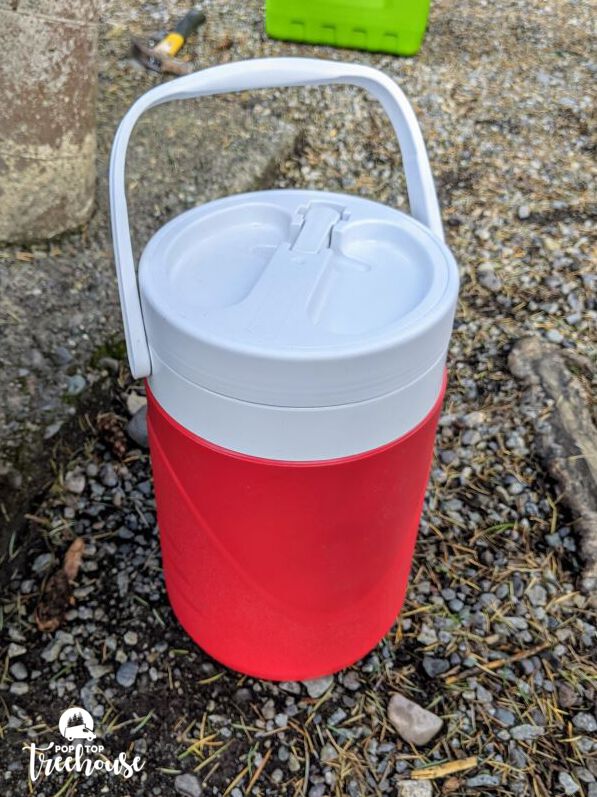
6. DIY Ice Packs
While you’ll need ice in your cooler to keep perishable food cold, it can be cringe-worthy to buy it in a plastic bag at the store. As an alternative, fill up reusable water bottles with tap water a few days before you leave and freeze them, resulting in DIY ice packs. Once the ice melts, you can use it as drinking water.
Another idea is to start filling a mesh bag with ice from your freezer a few days before you leave. It will take some time to make enough ice to fill the bag, so start early with this task. It can also be helpful to freeze some foods like meat ahead of time. Anything frozen that is put into the cooler will help to keep the temperature nice and cool for longer. Personally, I like to whip up a batch of cookies a week before camping, freeze them, and then pop them in just before I leave!
7. Bring Your Own Cleaning Supplies
You’ll inevitably make a mess while cooking. Make sure you’re prepared for cleanup to avoid attracting bugs or other critters. Pack your own natural cleaning spray and rags so you won’t introduce any chemicals to the environment or throw away paper towels. Also, be sure to bring biodegradable dish soap.
8. Clean Up After Your Pets
If you bring your dog on your camping trip, cleaning up their waste is unavoidable. Opt for compostable dog poop bags and keep a close eye on your pooch so you don’t miss them doing their business. Even if it is deep in the woods, dog feces carry bacteria that have an adverse effect on the environment.
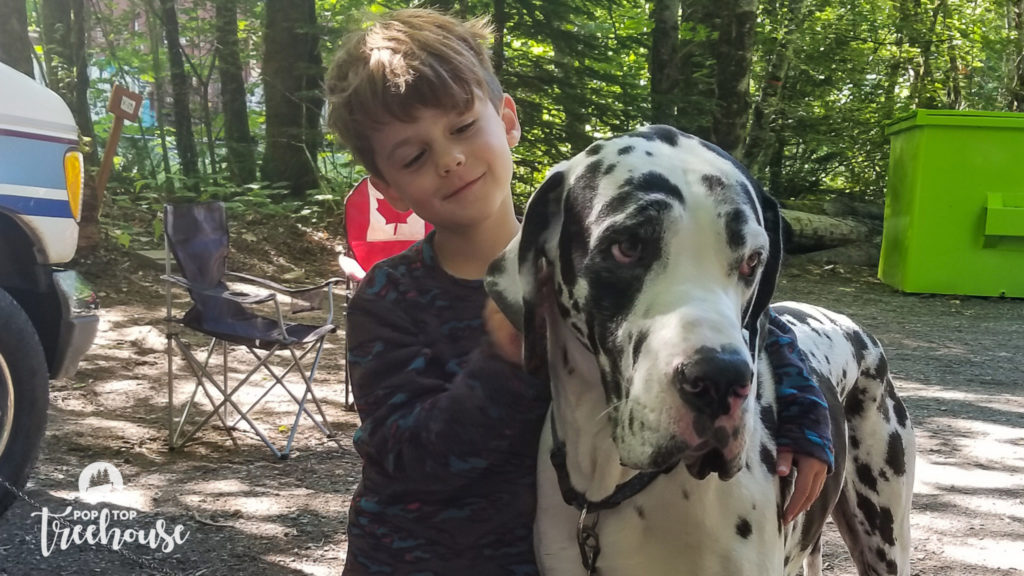
9. Stay Local
If you’re driving to your campsite, you’ll use fossil fuels to get there. Instead of taking a long trip far from home, maximize your time in nature and minimize your environmental impact by visiting a local park. A quick internet search will tell you which campsites are close to your home. There are likely some undiscovered gems that will be less crowded than more popular state and national parks. Sometimes all we need is a place to get some greenery in and get away from all the hubbub and noise!
10. Help Others Leave No Trace
Although you’re opting for a zero-waste camping trip, not everyone is as mindful. Give Mother Nature a helping hand by packing biodegradable or reusable bags and filling them with trash you find in the park. Separate it into recycling, compost, and landfill and dispose of it properly at the park or when you get home.
11. Spread the Word about Zero-Waste Camping
Don’t be afraid to insert zero-waste camping into your conversations on the trip. People who frequent the great outdoors love to talk about gear. So, if someone asks you where you got your tent, you have an opportunity to tell them about how all of your gear is either used or secondhand. If you lend out your homemade bug spray, be sure to share the recipe and talk about how it’s chemical-free. Your zero-waste efforts can inspire others to do the same!
Camping and zero waste go together so naturally. Although zero-waste camping takes a bit more effort at first, ultimately, it’s what makes the most sense. By bringing as little as possible into the outdoors, we not only help to minimize our impact, but I also believe it helps us appreciate the experience of camping more. I hope you have found some of these suggestions helpful and will choose to incorporate them to avoid producing waste on your next camping trip.
Save this Post on Pinterest
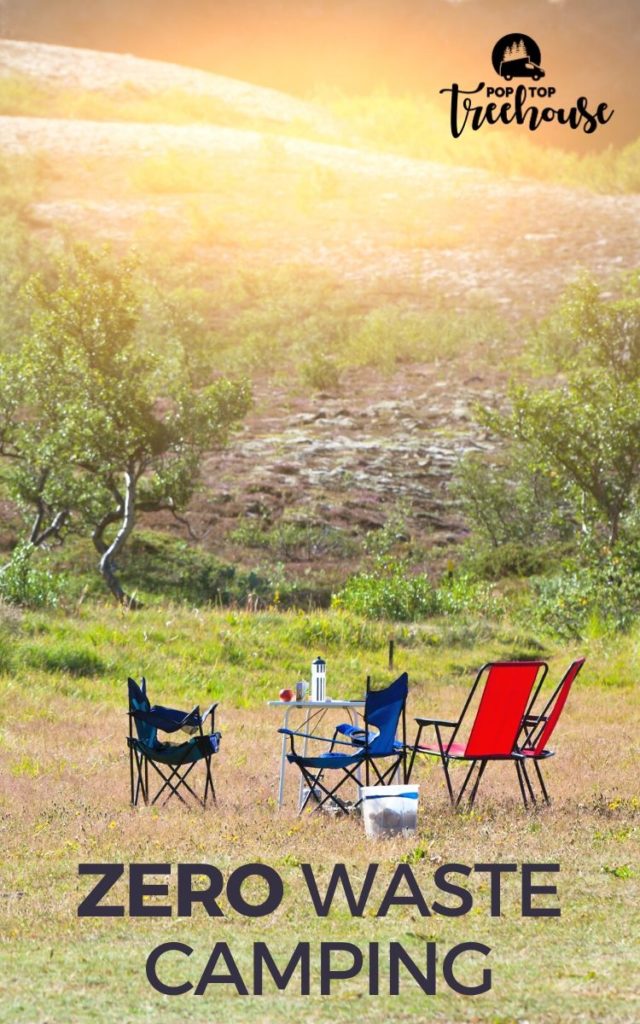

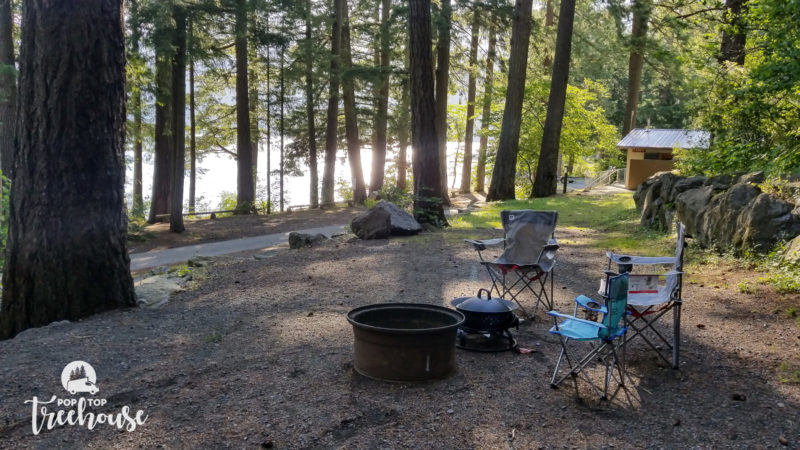
 Walnut Chocolate Chunk Cookies
Walnut Chocolate Chunk Cookies

[…] protect the environment you’re camping in and steward it for future campers, practice the Leave No Trace principles. Choose the campsite that will disturb the environment the least. So if the area you’re visiting […]